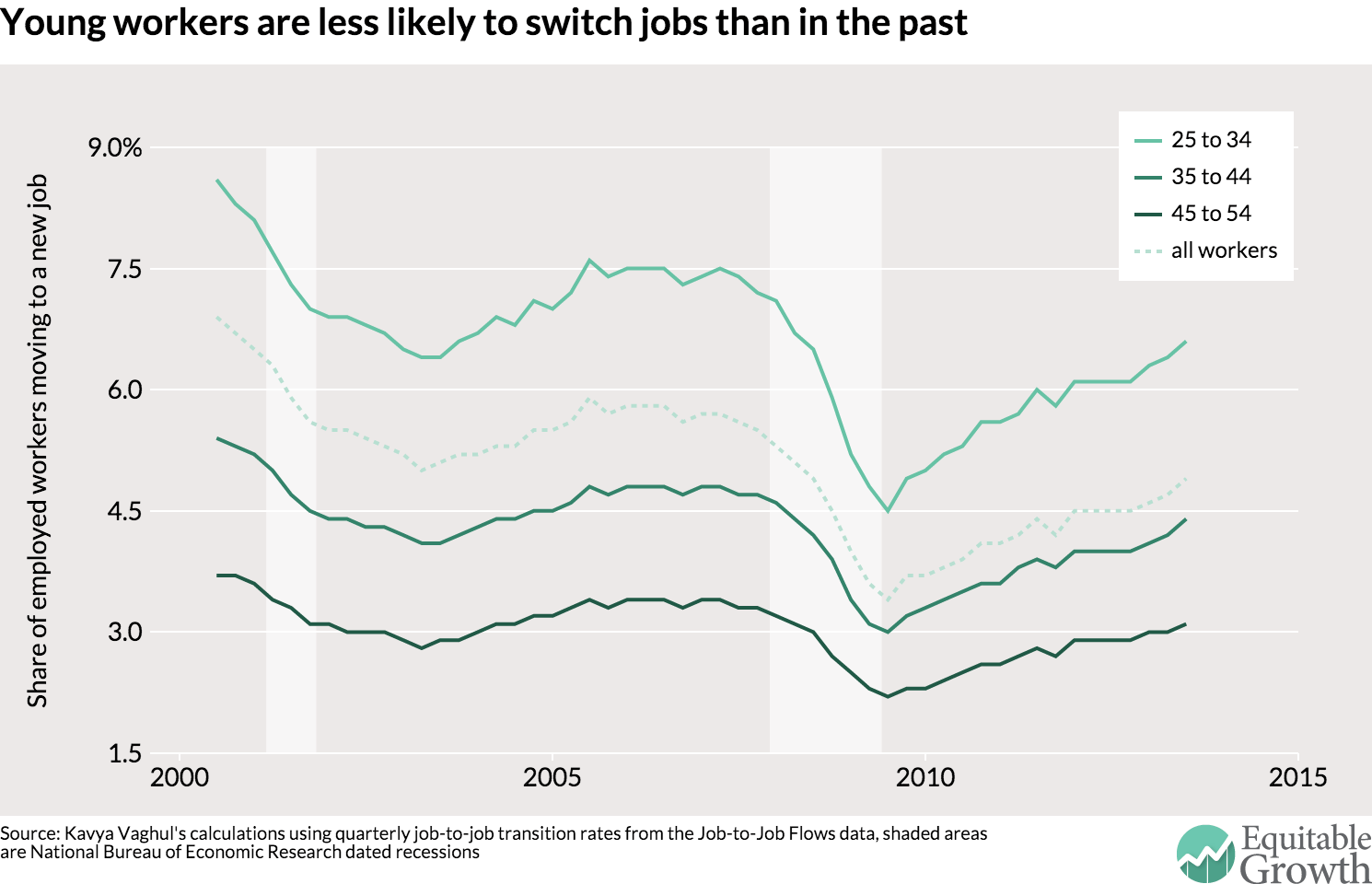Why it’d be nice if the “job-hopping” Millennial story were true

If Horace Greeley were alive today, his advice to young people would probably have less to do with physically moving as much as moving jobs. Moving from job to job early in a career is a positive sign for earnings and wage growth as young workers gain experience, find what career path they might enjoy, and climb the job ladder to higher-paying jobs. So while we should be focused on the total amount of quitting and job-to-job movement as a sign of the health of the labor market, we should keep a particular eye on these trends for young workers. And it’s worthwhile to dispel some myths about young workers and their propensity to switching jobs.
The entrance of the Millennial generation (those roughly 18 to 34 years old) into the U.S. workforce has caused a bit of consternation among older generations, even provoking deep study into the generation by some managers. One stereotype of the younger generation is that they are constantly hopping from one job to another, unable to hold one down. Unfortunately for that narrative, the data don’t seem to back it up. Both Jeff Guo of the Washington Post and Ben Casselman of FiveThirtyEight have written pieces citing data showing that young workers today are actually less likely to jump from job to job than in the past.
Yet the narrative endures. Last week, Natalie Kitroeff wrote a piece for Bloomberg Business in which she asks if these younger workers are less likely to stick to a job. Millennials, in her telling, “seem categorically opposed to spending their lives at one desk.” Because the quits rate data from the Job Openings and Labor Turnover Survey can’t be broken down by worker age, however, she says she can’t tell if young workers are quitting and switching jobs at a higher rate.
But data from the Job-to-Job Flows data set are broken down by age, so we actually can tell how job switching is changing across the age distribution. Like JOLTS, the Job-to-Job Flows data set goes back to 2000. Looking at the data, young workers are more likely to switch jobs than older workers today, but that’s been true for the entire time the data set covers.
 Since 2000, the job-to-job transition rate for all U.S. workers has been on the decline. From the peak of the overall transition rate in the third quarter of 2000 to the third quarter of 2013, the rate for workers ages 25 to 34 declined by about 23 percent. Over that same period, the switching rate fell by 18 percent for workers ages 35 to 44, and by 16 percent for workers ages 45 to 54. The decline has been the largest the youngest workers.
Since 2000, the job-to-job transition rate for all U.S. workers has been on the decline. From the peak of the overall transition rate in the third quarter of 2000 to the third quarter of 2013, the rate for workers ages 25 to 34 declined by about 23 percent. Over that same period, the switching rate fell by 18 percent for workers ages 35 to 44, and by 16 percent for workers ages 45 to 54. The decline has been the largest the youngest workers.
The recovery in job switching has also been quite similar by age. From the second quarter of 2009—the end of the Great Recession according to the National Bureau of Economic Research—to the third quarter of 2013, the transition rate for 24- to 34-year-olds increased by about 37 percent. The increase for 34- to 55-year-olds was 42 percent and 35 percent for 45- to 54-year-olds.
So not only are young workers less likely to switch jobs than in the past, but the increase in job switching has been strongest for older workers.
This decline is worrying. Young workers have been increasingly working in low-paid industries since 2000, which means they’re starting their career low on the job ladder. Combined with a declining transition rate, this means young workers are less likely to move up the ladder, resulting in weaker wage growth and lower upward mobility during a lifetime. A labor market where young workers were increasingly likely to move from job to job would be a quite good thing. Sadly, the data tell us something else.
Update: Penultimate paragraph edited for clarity.

